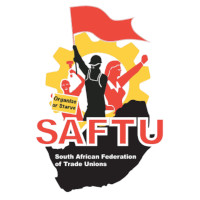▶️ this post first appeared on SAFTU
BY SAFTU
The South African Federation of Trade welcomes the turnaround of South African Airways( SAA), the state carrier. SAA has been plagued by maladministration, corruption, and a negative balance sheet for many years.
The Interim Board of SAA presented the results of its turnaround at its Annual General Meeting on November 20, 2024. The report stated that the long-struggling state-owned carrier recorded its first net profit of R252 million in ten years for the financial year 2022/23. In addition, the carrier’s balance sheet registered positive equity of R4.7 billion settled all its legacy debt obligations, and became debt-free.
The change in SAA’s fortunes comes at a critical time in the mainstream economic discourse, a time when it has become trite that SOEs are a burden on the national fiscus that must, therefore, be sold off to the private sector, which is a paragon of efficiency, clean governance and not prone to corruption. South Africa’s Deputy President, Paul Mashatile, expressed this view in an interview with the Sunday Times in July 2024. Echoing mainstream economic opinion, Mashatile stated that he would prefer the public carrier be sold. Or if not, he would at the very least like it to go into the so-called public-private partnership to unburden the national fiscus.
The drive to sell off state-owned entities, which presents itself as an evidence-backed objective scientific conclusion, is ideological smoke and mirrors. It is an attempt to manufacture public consensus in the interest of capital. It is based on the neoliberal dogma that sees the private sector as inherently efficient, corruption-free, and providing affordable goods and services to the public. The mandate is public evil, private good. This logic explains the deafening silence of the National Treasury in its latest Medium Term Budget Policy Statement about the R3.8 billion requested by the business rescue practitioners to conclude the South African Post Office business rescue process.
But the push for the privatisation of SOEs under the guise of efficiency is a neoliberal Trojan horse whose belly is pumped full of unaffordable prices, the exclusion of the overwhelming majority of the working class from services, and massive profits for private corporations.
The SAA is not the only SOE to have recorded a positive balance sheet. In September 2024, the Airports Company South Africa(ACSA) announced an after-tax profit of R472 million for the financial year 2023/2024. Moreover, ACSA increased its revenue by 16% to R7 billion from the previous R6 billion recorded in the last financial year. Before, interest, tax, depreciation, and amortisation earnings increased by 51% to R2.9 billion from R1.9 billion. All this while the entity is operating in a hostile, globally competitive market.
The turnaround of these two SOEs belies the neoliberal truism that SOEs are an inherent fiscal liability and must, therefore, be sold off to the almighty, the all-knowing, and the ever-efficient private sector. Further, the turnaround lends credibility to our long-held position. If recapitalised, administered with due diligence by competent personnel, and corruption weeded out, SOEs can return to their former glory. Had the South African Post Office (SAPO) received the R3.8 billion requested by the business rescue practitioners to complete the business rescue, it would have been turned around. Had Telkom not been allowed to undermine the Act that established it by handing over the telegraph business to British BT (British Telecom), SAPO would not be in the dire straits it is today.
The cash flow problems that have haunted the SAPO compelled it to enter into business rescue three years ago to avert liquidation. In this process, the SAPO received R2.4 billion from the Treasury as part of the business rescue deal. With these funds, the business rescue practitioners settled the entity’s debt obligations and restructured it with the business rescue plan. Since entering business rescue, the SAPO has registered progress. Between June 2023 and June 2024, the SAPO has turned its net asset value from a negative R7.9 billion to R840 million, bringing it into solvency. Furthermore, the SAPO has since seen operations improve – reducing backlogs in its mail centre and completing data centre migration.
The neoliberal mantra that SOEs must be sold off has been thoroughly negated by the successes of SAA and ACSA. SAA and ACSA exemplify how Eskom, Prasa, Transnet, Denel, and other critical SOEs can be rehabilitated in public hands.






